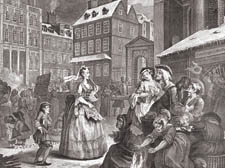|
|
 |
| |

The Four Times of Day: Plate I, Morning by William Hogarth, 1738 |
Georgian boom and bust!
18th-century life across the capital was shaped by property developers and the power of prostitution, writes Illtyd Harrington
The Secret History of Georgian London.
By Dan Cruickshank. Random House
ENTRY into the world’s oldest profession still demands only one qualification – namely that you sell your body for another’s sexual gratification.
Dan Cruickshank, known on TV for his restless grasp of anticipation and arms that spin like a windmill, is the acknowledged anthropological-architect of 18th-century London.
According to Cruickshank, the sharp rise in population and consequential building boom moved London westward and the more profitable segment of the sex industry with it. An arc of 180 degrees from Shoreditch in the east via Moorfields and St Paul’s to Hyde Park Corner was where the sexual highway ended in the west.
High-earning prostitutes and ruthless property speculators were the dynamic force behind it. In the east, street walkers, in the west, the wealthy madames – and other high-class ladies in luxurious salons.
The number of sex workers ran into many thousands, who could earn two guineas per service or £400 a year minimum, compared to farm labourers on £24 a year or domestic servants on £5 per annum.
Cruickshank retells the tales of some of the most notorious practitioners – Moll Hackabouts and her friend Betty Careless, Moll King perhaps the basis for Daniel Defoe’s model for his outrageous book Moll Flanders, and her successful saga in London’s other world.
Moll King and her husband Tom move to the rural peace of Belsize Park. She sensed the mode of change and built four terrace houses on the corner of Haverstock Hill and Steeles Road, where she died in 1747, leaving a “huge fortune from the follies of vice and profligacy of the age”.
Casanova, the insatiable European lover, haggled with an experienced prostitute and felt pleased with his next bargain costing £6/6shillings, although virgins – in great demand – were £50 a night. These virgins were reincarnated as new virgins.
The favourite drink among the sex workers was Ratafia – a lethal potion which eventually produced hydrogen cyanide. Drugs were in common use and the equivalent of pot and other substances from hemp were easily obtained.
Cruickshank believes that about £8million found it’s way into the London economy. That should be multiplied by around 100 for its modern equivalent. So the sex industry blossomed throughout Soho, Drury Lane and Seven Dials. The cash rolled in and so did VD, allowing syphilis to claim many deaths.
Bet Flint operated from No 9 Meard Street, Soho. Numbered among her friends, the distinguished author of the English dictionary, Dr Samuel Johnson, described Bet as “generally a slut and drunkard, occasionally, a whore and a thief”. What a forthright friend.
At the head of them all was Kitty Fisher at the top echelon of this rapacious sisterhood. On one occasion she was offered a £100 bank note by a panting pundit which she contemptuously put in a sandwich and ate. Her price was beyond rubies – she is reputed to have earned £12,000 in 18th-century coinage – about £500,000 in our money.
Kitty died while married to a country vicar in Kent – a victim of cosmetics from being too liberal in the application of lead-based white powder.
The nursery rhyme goes “Lucy Lockett lost her locket, Kitty Fisher found it” – make of that what you will.
Tragically in 1785, 5,000 prostitutes died from disease, abuse and malnutrition. There is a contemporary resonance with 1752 when a harsh repression north of the Thames predictably caused a relocation to Southwark. It moved the problem, but we still live with it.
Cruickshank threads his narrative with the turbulent history of the time, with the righteous and religious commanding vengeance, a moderate crying compassion and extension of homes similar to Coram’s Foundling Hospital.
This is a never-ending but absorbing story where hypocrisy generally rides over reason. Even then, there were advocates of licensed and medical services provided in brothels. Sadly, there’s no shortage of graduates still joining the oldest profession.
• |
 |
|
|
 |
 |
|
 |
|


